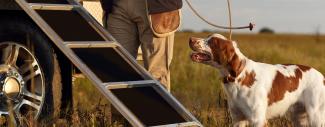Travel Tips For Road Trips With Your Hunting Dog
There’s hardly a better way to expose your dog to a variety of feathered species and diversity of habitat than loading up your gear and hitting the open road. For some, a bird hunting road trip is an annual tradition, but for others it’s a rare opportunity worthy of intense planning and preparation.
While anticipation is running high and the itinerary of your hunting adventure takes shape, it’s also prudent to sketch out a plan to care for your canine copilot along the journey. A few extra steps in preparation on their behalf can prevent or mitigate a disaster far from home.
Veterinary Care
As soon as you’ve got GPS pins dropped and routes drawn for your adventure, investigate the local veterinary clinics in the area. Take note of their locations, hours and emergency protocols, as many rural clinics now refer complicated (or all) cases to a regional emergency clinic on evenings or weekends. Store their numbers and addresses in your phone before leaving home. In many of the best hunting habitats, scant cell reception may suffice to make a timely emergency call, but it’s highly unlikely you’ll have enough bandwidth for browsing the web for a local clinic’s information, directions or Google reviews.
Food Is Fuel
Dog food is an essential item on your packing list, as it’s undeniably the cornerstone of keeping your hunting companion performing optimally for the entire adventure. I strongly recommend a commercial performance kibble in a safe and sturdy container year-round, but for me it’s a non-negotiable for traveling with dogs. Not only does dried kibble pack a lot of energy in a small morsel, it’s designed to maintain its integrity in the face of temperature and humidity swings of the hunting season. If your supply runs short, most of these performance kibbles can be purchased at retailers along your route or shipped quickly to your hotel courtesy of numerous online vendors.
Travel Stress
Even while relishing the opportunity to practice their life’s work on the road, hunting dogs are prone to travel stress amidst the excitement of an epic road trip. The gut is the quintessential stress organ for the canine, and even subtle stressors can tip the delicate balance of good and bad intestinal flora towards disaster. Novel terrain also offers dogs a fresh menu of new, tasty morsels to sample from the field – an indiscretion that can also contribute to digestion distress. Preventing diarrhea in a working dog should be a top priority while on your trip. Not only is diarrhea a fast track to dehydration for a dog performing at their peak, it’s incredibly challenging to clean on the road.
I reach for Purina’s FortiFlora probiotic in the days leading up to and throughout our trip to help fortify the population of beneficial bacteria in my dog’s gut and safeguard against travel stress. Among my team, the packets are unanimously tasty, and they're easy to administer at mealtime. As an added bonus, FortiFlora’s high palatability helps entice dogs that are paradoxically disinterested in food after working hard into cleaning the bowl.
Protect Your Water
Fresh, clean water is an essential element for a safe and successful hunting road trip. Don’t skimp on the volume or rely on Mother Nature to provide a reliable supply. Store your water in multiple BPA-free containers in the event of a leak and offer it liberally to your team before, during and after the hunt. As the days get short and nights cool – especially in the West – protect your water supply from freezing. I know from experience there are few things less helpful than 5 gallons of solid ice to rehydrate working dogs in the field or brew a cup of morning coffee.
Closing Thoughts
Above all, be safe and have fun. Cherish the time and experience with your dogs, and don’t hesitate to take photos. With the extra effort you’ve invested in planning for the safety and well-being of your dogs, it’s sure to be the trip of a lifetime.

